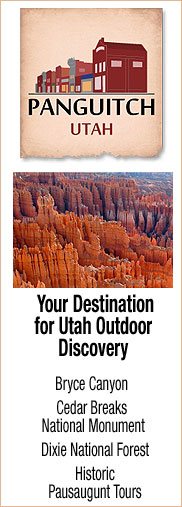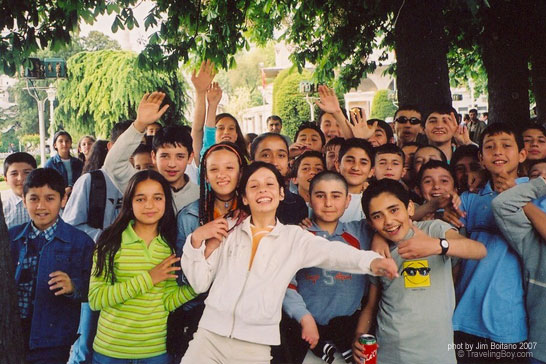|
 s I stand at the edge of the lush sloping
25-acre gardens of the Istanbul Hilton, I breathe the air of two
continents and gaze out over the gleaming blue Bosphorus Strait.
I hiked all the way up here from the train station to find Saladin,
my occasional traveling companion, who's having lunch with his
girlfriend, an Indian princess from Kashmir. I wish it would rain
and cool things off. Apparently August isn't the rainy season.
I'm soaked with sweat.
s I stand at the edge of the lush sloping
25-acre gardens of the Istanbul Hilton, I breathe the air of two
continents and gaze out over the gleaming blue Bosphorus Strait.
I hiked all the way up here from the train station to find Saladin,
my occasional traveling companion, who's having lunch with his
girlfriend, an Indian princess from Kashmir. I wish it would rain
and cool things off. Apparently August isn't the rainy season.
I'm soaked with sweat.
Saladin (whose real name is Julio - he's from Peru) has my laptop
and a stack of Turkish travel postcards he's chosen for me. I've
come to Istanbul, Turkey's most populous city, and its cultural
and financial center, to rediscover the marvel of this ancient
and highly seasoned mixture of religious, social and political
ideas.
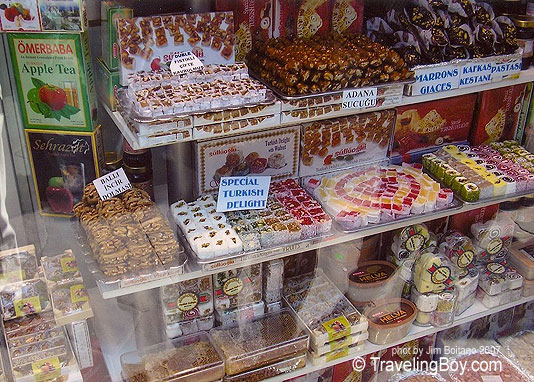
When the fellow in the alley urged me to
try Turkish Delight,
I didn't expect a candy confection.
Terrorism is alive and well in the world,
thanks to the Cheney-Bush administration's ferocious efforts to
expand the American Empire. I'm learning this everywhere I go.
As an American abroad these days, in particular an open-minded
American willing to discuss politics, I am subjected to relentless
abuse about my government's current leadership and its misdeeds.
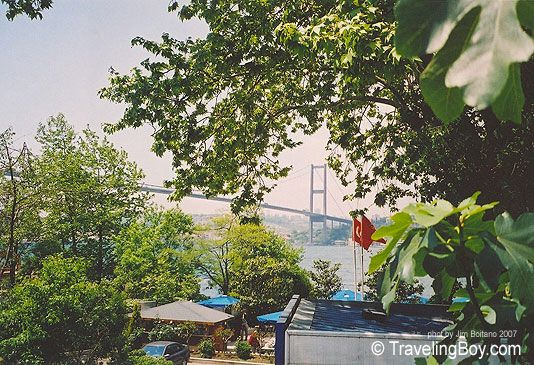
Looking across the Bosphorus from Asia to
Europe, wondering
how to bridge America again with the Muslim world.
Our allies, the Turks, believe they can
teach us a lot about diplomacy and restraint. How a nation such
as Turkey has survived united, geographically situated in both
Europe and Asia, historically linked to the great events of Western
civilization yet wedded to the rich cultural heritage of the Middle
East, is a remarkable model of compromise and tolerance. Or so
I thought.
Ah, Byzantium.
It's another five degrees hotter and I don't know where Saladin
and his princess are dining. I wonder which restaurant in this
massive hotel complex to search first. I could use a beer.
There's a fellow who's been following me for about an hour, offering
me means to transportation, food, lodging, Turkish rugs, anything
I need - for a fee. He calls himself Mahir.
"Mahir, I'm fine. No problem," I tell him. But he is
earnest and wants to talk.
"Not much money. Just a little," he promises. "I
can get you a car, take you anywhere. A good clean hotel. Great
prices for you. Rugs - Turkish, Persian, anything you want."
"I'm looking for my friend. After that - maybe," I tell
him. Big mistake. He's encouraged.
"Your friend too. Anything he wants. Or she..." he adds,
smiling. "No?"
There's something about the delicious aromas
mingling in the humid stifling air that takes me back to yesterday,
many years ago, when I first came to Istanbul. Most of the seven
rolling hills on the original peninsula upon which the city was
built were green with trees and fields filled with sheep and goats.
I sat in a loud, colorful, crowded marketplace, eating dolma with
vegetables and melon, and pide, a fresh round flatbread. I knew
about the subtle refinement of Turkish cuisine, a centuries old
mix of Turkic, Arabic, Greek, Armenian and Persian cooking. I
remember the wonderful winehouses where one can sit all afternoon,
sipping fine wine with serious French influences, or dine at one
of the countless fresh seafood restaurants that numbered in the
hundreds in every district of the city. I was sitting alone, watching
the merchants engaging tourists in lively exchanges over carpets,
leather goods, belly dancer outfits, copper coffee pots and all
sorts of food and trinkets. I never thought I'd come back to Istanbul.
Today, these once pristine natural hillsides are completely covered
with houses and apartment buildings, a testament to the phenomenal
growth of the city, now numbering more than 14 million people.
These Turks have left their countryside, the farms, ranches and
rural businesses, for the greater promise of the riches of the
city. And every Turk I speak to has an opinion about everything.
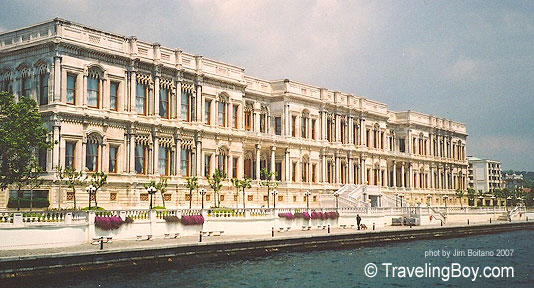
Walking past Sultan's Palace with a dog the
locals affectionately call "W".
Walking around the Hilton is becoming tiresome.
This isn't the real Turkey. Actually, I could simply call Saladin
on my mobile phone. It only costs something like ten dollars per
minute around here and he could tell me where he is. Except he
never answers his phone. He probably doesn't ever turn it on.
I don't blame him. I'll wait until later when we're supposed to
meet at the Istanbul Archaeology Museum. Now I think I'll hike
across to Topkapi Palace, possibly Istanbul's most famous architectural
landmark.
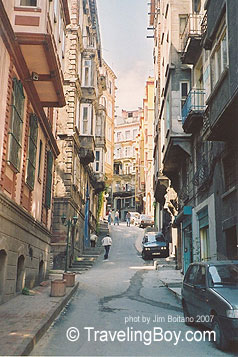 That's me, lost again after spending
another afternoon at a popular
That's me, lost again after spending
another afternoon at a popular
Istanbul winehouse. |
"Mahir," I say. "I appreciate your
offer, but I'm fine. OK?"
"You do not understand about the rugs," he explains,
handing me his business card. "They are are hand made. The
best ones take three years to complete, thread by thread. One
woman, or man, alone, puts her whole life into a single rug. I
can get them for you for next to nothing." He says "next
to nothing" just the way he's heard it on American TV in
used car advertisements.
I laugh. "Thanks, but no." Topkapi looms above me. I
fumble for my camera. Mahir suddenly calls out to a friend who
now rides up on his bike and stops to join us.
Standing in the beautiful courtyard of Topkapi Palace, Mahir introduces
me to Ali. "Ali is my friend since childhood." Mahir
explains. "Even though Ali is Persian, and I am a Turk, we
are friends. Only in Turkey, eh?" Mahir slaps Ali on the
shoulder and Ali laughs.
"Yes, my friend," Ali says and extends his hand to me.
"I am Ali, friend of Mahir the Turk." They both laugh
and I shake Ali's hand.
"So," I blurt, never smart enough to avoid saying something
stupid. "You both are an example of the cultural melting
pot today in Turkey, eh?"
"If you refer to race," Ali says, frowning. "We
are Turk. First and foremost. And we are Muslim. Although my brothers
are more devout than I, and they put Allah above country or family."
Ali's expression is serious, almost dark.
"We have radicals, just like everywhere, just like your United
States," Mahir adds. "But not just Muslim. Also Jew
and Christian. We have many minority religions of Greek Orthodox
Christians, Armenian Christians, Catholic Levantines and Sephartic
Jews. They are not always content either."
"But," I ask. "Turkey seems free of the terrorism
that riddles the rest of the Middle East and parts of Europe.
How do you come by this tolerance?"
"We are tolerant because we are Turk," Ali says proudly.
"But what about your border areas? Kurds, Persians, Armenians..."
I begin.
"All Turk!" Ali repeats firmly. "No Armenians.
No Kurds. Only Turks."
"But..." I protest. Mahir touches my arm.
"We are all Turks," he says quietly. "There are
ethnic and religious differences, but we are proud of our country,
our history, our families. And that comes first."
Ali interjects, "Your government wants to condemn us for
defending our country against riots and civil war. And not even
this Turkish nation, but the old Ottoman Empire - not part of
who we are today, but part of our proud heritage."
"You mean the Armenian genoc..." I stop myself. But
not in time.
"No genocide! Not a genocide!" Ali snaps. "You
are a guest in our country. You must be respectful of our history.
Not like your president and his politicians. There was terrible
loss of life on both sides of the uprising. Unfortunate. A terrible
time for us all. But we are now all Turks."
"You see," Mahir explains. "We are a Muslim country,
but most of us prefer a secular government. A government that
doesn't interfere with our religion, that is populated by Muslims
who understand we must learn to live with the world."
"I meant no disrespect." I say sincerely. It sounds
like a line from an Indiana Jones movie. I almost sense sabres
are about to be drawn.
"None taken," Ali calls out, waving his arm then taking
my hand again in his. "We are patient with you Americans.
You are like children. You do not understand the ways of the world.
Your leaders are ignorant. We have compassion for you, America,
a great and wonderful nation."
"I understand how you might feel that way," I say, again
sincerely.
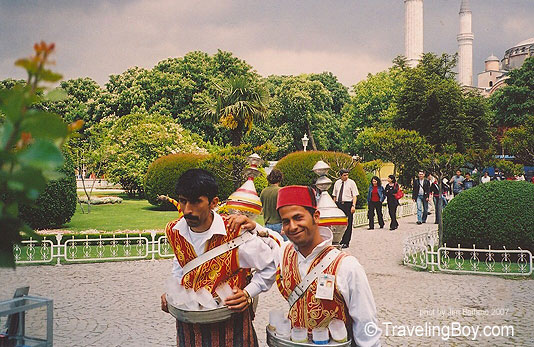
I'm there, in the bushes. The tea vendors
warned me the
Turkish blend was very powerful.
The sun drops behind Topkapi and shade envelopes
us. The rich colors of the Bosphorus below us, the boats on the
water, the houses glimmering on the hills, are heightened in the
deep afternoon light. The heat remains stifling. All at once we
hear the call to Salaah, Islamic prayer.
Muslims are bound to pray five times a day, and this is the mid-afternoon
Salaah. On each occasion the call to prayer is preceeded by Adhaan,
holy verses honoring Allah, voiced by the muezzin, or crier. His
solo voice rises in praise to Allah, now together with voices
coming from all the hillsides and countless mosques in the city.
Mahir and Ali take turns and bid me farewell. They will go to
the nearest mosque to join the congregation in prayer. I thank
them for the warm companionship and good conversation, and they
thank me even more heartily for the same.
"We shall meet again. Perhaps you will return for the Istanbul
International Film Festival," Mahir says before he walks
away.
"I'll look forward to it. It's one of best in Europe,"
I observe.
"It is the very best in all the world!" Ali shouts,
already wheeling away on his bike. Then he laughs and yells, "Definitely
one of the best."
Ali has disappeared from the courtyard and now Mahir is also gone.
I ponder whether to tour Topkapi now, or to retreat to the museum
to find Saladin. I am curious about Saladin's princess. What is
she like? I wonder about her life as Hindu royalty in Kashmir,
a nation administered by Muslim Pakistan. How does he meet such
interesting people everywhere he goes?
|






![]()



